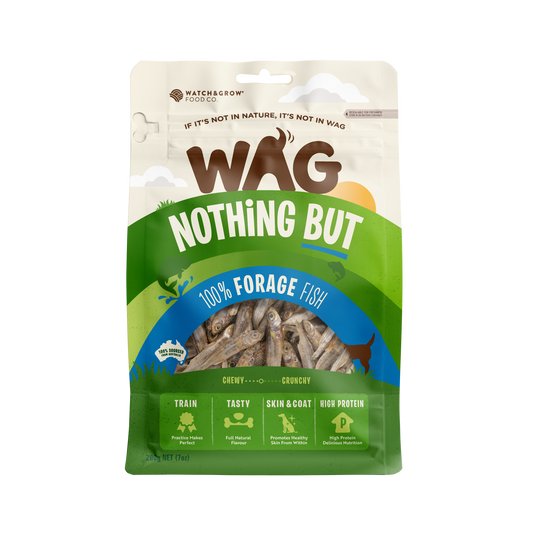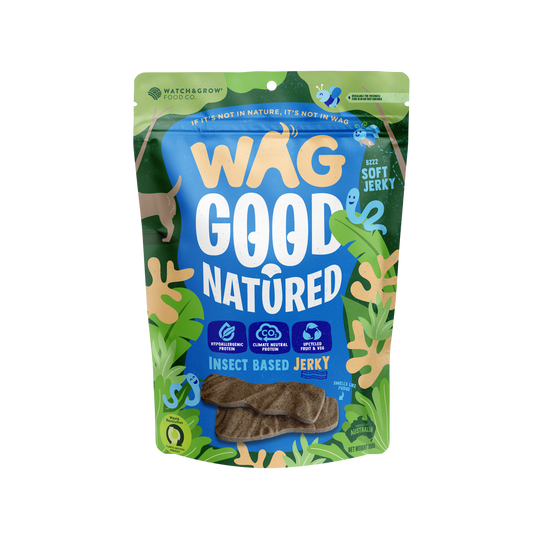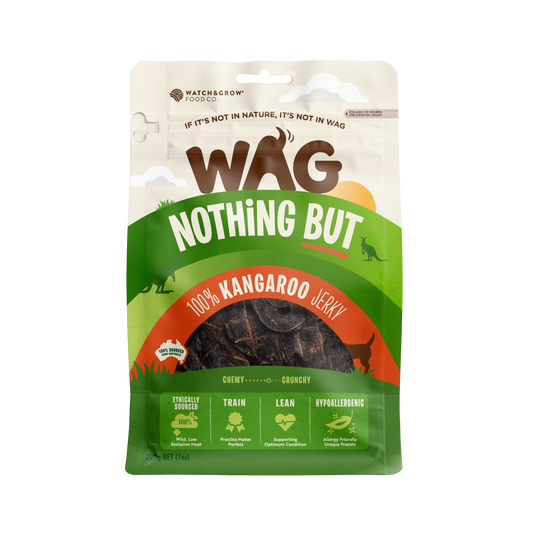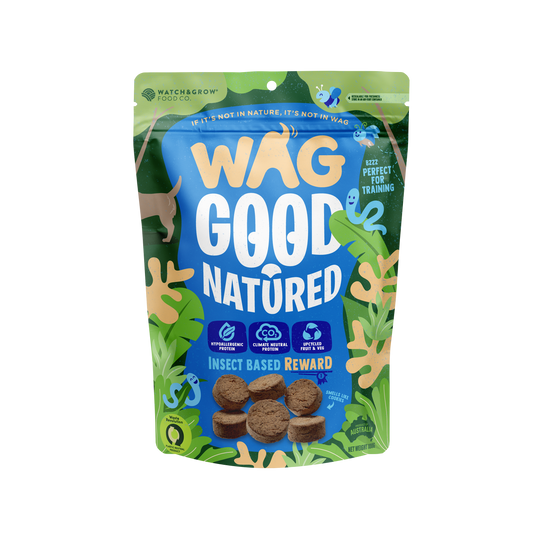What are novel proteins for dogs? Here's why they're worth wagging about

Let’s talk about novel proteins (and why your dog might love them).
Novel proteins are the up-and-coming heroes in the dog treat world. They’re shaking up the pet aisle (in the best way) by giving doggos something different, delicious, and often better for their sensitive tummies.
Whether your furry mate has food allergies, a picky palate, or you’re just looking to switch things up, novel proteins could be the answer. So let’s chew into what they actually are and why they matter.

What are novel proteins, really?
In dog food and treat lingo, a ‘novel protein’ is simply a protein your dog hasn’t eaten before. These proteins are considered ‘novel’ because they’re new or uncommon in typical commercial pet diets.
Common proteins like chicken, beef and lamb have been the go-to for ages. While they’re still fab, some dogs can develop sensitivities or allergies after repeated exposure. So, here is where novel proteins can come into the mix to offer some variety. Think kangaroo, venison, duck, rabbit — and even insects (yep, really).
Since your dog’s immune system hasn’t encountered these proteins before, it’s less likely to react badly to them. That means fewer itchy bellies, scratchy ears or digestive dramas.
Why do dogs need novel proteins?
You might be thinking, ‘My dog’s always been fine with beef, why change?’ Here’s the scoop:
-
Allergies and sensitivities: Just like humans, dogs can develop intolerances and food sensitivities over time. Common signs include itching, digestive issues or general grumpiness (same, right?). Switching to a novel protein can help reset their system.
-
Rotational diets: Giving your dog a variety of proteins can help prevent intolerances in the first place, while also supporting a balanced diet.
-
Better digestion: Some novel proteins, like kangaroo or venison, are naturally lean and easier on the tummy.
- Cleaner sourcing: Because they’re less mass-produced, novel proteins are often sourced more sustainably and ethically, which is a big thumbs up from conscious pet parents like you.

What counts as a novel protein?
Great question. What’s ‘novel’ depends entirely on your dog’s history. If your pup has never had duck before, duck is novel to them. At WAG, we offer a heap of single-protein treats made from:
-
Kangaroo – Lean, high in iron and great for allergies.
-
Venison – Packed with B vitamins and omega-3s.
-
Rabbit – Light, digestible and full of flavour.
-
Insect protein – Our new Insect Jerky is made from vertically farmed black soldier fly larvae. It’s hypoallergenic, sustainable, and full of the good stuff (protein, amino acids and fatty acids, minus the emissions). It's a great swap for meat treats, and smells like fudge and tastes just as good (to your dog, anyway).
If your dog’s had enough of chicken or beef, the exciting news is that there’s a whole world of novel treats to explore.
Novel proteins and food allergies: What’s the link?
Food allergies in dogs often stem from overexposure to the same protein sources. Think of it like your dog’s body saying, “I’ve had enough chicken, thanks.”
Novel proteins help break this cycle by giving your dog’s immune system something new.
Vets often recommend them as part of an elimination diet to identify allergies or just to soothe symptoms like:
- Chronic itching
- Upset stomachs
- Rashes or hot spots
- Scooting or ear infections
Of course, if you’re concerned about your dog’s health, it’s always best to chat to your vet for tailored advice. This info is general only, and we’re here to wag tails, not replace professional opinions.
Are novel proteins sustainable?
In many cases — absolutely! Especially when we’re talking about insect protein.
Here’s why we’re buzzing about our new Insect Jerky:
-
Minimal land & water use – Insects are tiny but mighty, needing far less than traditional livestock.
-
Low emissions – Insect farming emits fewer greenhouse gases, making it a climate-friendly protein source.
-
Ethical & clean – We source our black soldier fly larvae from reputable farms. They snack on fruit and veggies rescued from landfill.
Additionally, kangaroo is one of the most sustainable novel proteins out there. Unlike farmed livestock, kangaroos are wild-harvested in Australia under strict government regulations. That means no land clearing, no added water or feed, and minimal impact on the environment.
They're native to our landscape, so they naturally tread lightly, literally. Their soft feet and efficient grazing help preserve delicate Aussie ecosystems. Plus, kangaroo meat is lean, nutrient-rich and hypoallergenic, making it a win for both the planet and your pup.
It’s protein with a purpose. Good for your doggo, good for the planet.

How to introduce novel proteins to your dog’s diet
Curious to see if your dog will go wild for wild protein? Here’s how to ease them in:
-
Start small – Offer a small amount of a novel protein treat and see how they respond.
-
Watch for reactions – Monitor their digestion, skin, and behaviour. Any changes? Chat with your vet if unsure.
-
Mix and rotate – Once your dog has a few go-to novel proteins, rotate between them to support a balanced, allergy-friendly diet.
Why we care (and why WAG is all in on novel proteins)
At WAG, we’ve been making natural, ethically sourced treats since 2010. We’re dog people through and through, and we believe your furry mate deserves clean, honest treats.
That’s why we’re obsessed with single-protein, novel treats like our:
They’re perfect for dogs with sensitive stomachs, curious appetites or eco-conscious owners who want to make a difference.

Ready to try something new?
Novel proteins aren’t just a trend, they’re a smarter, cleaner way to feed your dog. Whether you’re dealing with allergies or just want to treat your pup to something a bit different, these alternative proteins are worth exploring.
Keen to give your dog a taste of the new? Try our Insect Jerky, Insect-Based Rewards or browse our full range of dog treats for sensitive stomachs.
Shop the Recipe
Up Next
Chews wisely: Beef tendons vs bully sticks compared






